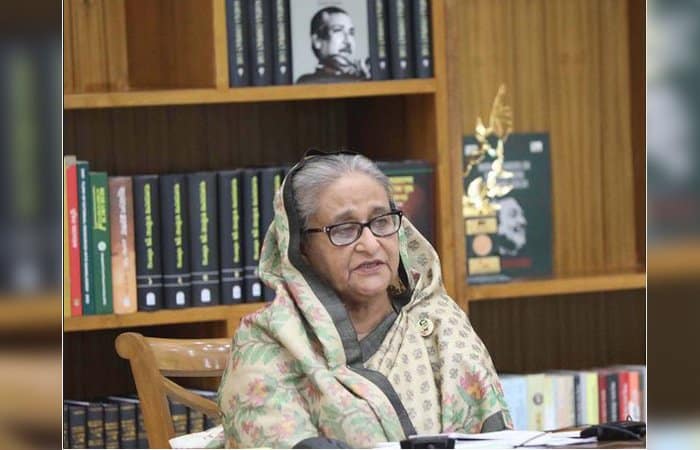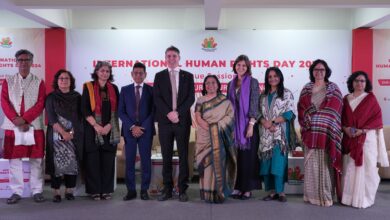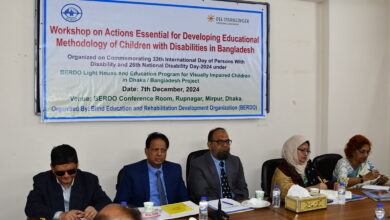PM re-stresses medical research to achieve excellence

Prime Minister Sheikh Hasina today re-emphasised to put concentration on research in the country’s medical sector, saying excellence is not achieved without research.
“Research in our health sector is so far insufficient . . . excellence is not achieved without research,” she said.
The premier made these remarks at the opening ceremony of Bangabandhu Sheikh Mujib Medical University (BSMMU) Super Specialized Hospital held at the BSMMU.
She joined the function virtually from her official residence Ganabhaban here.
The premier urged the country’s specialist physicians to spend more time on research alongside attending patients as research is very much urgent.
Expressing gratitude to BSMMU for their existing research works, Sheikh Hasina said, “BSMMU has to continue their endeavor in developing its education, research and medical activities.”
She also called upon all to pay more attention to research to attain excellence in this field.
She appreciated BSMMU’s own initiative for the appointment of Professor Emeritus to improve the quality of health education and research as well.
The prime minister urged all of the BSMMU’s faculties and researchers to uplift the overall activities of the university to international standards with their wisdom and talent.
With Health and Family Welfare Minister Zahid Maleque in the chair, BSMMU Vice Chancellor Professor Dr. Md. Sharfuddin Ahmed delivered the welcome address.
Medical Education and Family Welfare Division secretary Md. Saiful Hassan Badal and South Korean Ambassador to Bangladesh Lee Jang-keun also spoke.
At the outset of the function, a documentary on the super specialized hospital was screened.
Referring to a speech of Father of the Nation Bangabandhu Sheikh Mujibur Rahman on the opening of blood preservation and new female ward on October 8, 1972, the premier said doctors should devote themselves more to the treatment of common and poor people.
“Doctors should stay in villages. They should be good with patients. If you perform your duties properly, common people will get medical care easily,” she added.
Sheikh Hasina said on July 31, 1997, through a gazette notification of the health ministry, the decision to make IPGM&R as Bangabandhu Sheikh Mujib Medical University was announced.
“We were the first to establish a medical university in the country,” she said.
She also said BNP-Jamaat alliance after coming to power in 2001 first attacked this university and made it as a hub of irregularities, corruption and nepotism alongside bringing the quality of medical care and education down to the highest level.
Mentioning that they even demolished Bangabandhu’s mural, she said only because of political vendetta, the BNP-Jamaat alliance announced returning the institution to its erstwhile IPGM&R.
“But, the teachers, doctors, officials, nurses and employees of the university strongly protested it which forced them to retreat the decision,” she added.
Through 29 December 2008 elections, the premier said Awami League formed the government with a huge people’s mandate and it is working tirelessly to bring healthcare to people’s doorsteps.
She pointed out that the government has formulated a public health policy and are implementing this policy.
She said, “We’ve increased the number of hospital beds, medical services in general hospitals and specialized hospitals manifold. We’ve also built about 18,000 community clinics and union health centers to provide health care to the rural population.”
Apart from BSMMU, the prime minister said that they have established 4 more medical universities in Rajshahi, Chattogram, Sylhet and Khulna to provide quality healthcare and conduct necessary research activities.
“Medical universities will be established in each divisional city in phases,” she added.
The government is setting up new medical college, she said, referring that at present the number of government medical colleges is 39.
She continued that they have established new Dental College, Nursing College, Nursing Institute, Medical Assistant Training School and Health Technology Institute.
“Special attention should be given to the quality of education and hospital facilities of the private medical and newly established government medical colleges alongside increasing the quality of service,” she added.
The head of the government said that they have appointed 18,000 doctors in the last 13 and a half years.
More than 20,000 nurses have been recruited at the same time, resulting in increasing the number to 47,000 in the country, she said.
Sheikh Hasina said the job status of diploma nurses has been upgraded to 2nd class, while posts of midwives have been created at the field level and about 2500 midwives have been appointed.
However, doctors/nurses are not intending to go to district, upazila and union, she said, adding, “Everyone wants to live in Dhaka.”
The Ministry of Health and the Directorate of Health should look into this issue with special importance as communication across the country has developed much more, she added.
With state-of-the-art equipment and modern operation theaters, the BSMMU super specialized hospital will provide treatment to all critical patients referred by any public or private hospital, or a physician.
The premier said some 5,000-8,000 patients will receive outdoor services at the hospital, which would help save around Taka 350 crore annually.
This specialized hospital will be an alternative option for many Bangladeshis opting to go abroad for treatment.
Officials said the hospital will have 750 beds. There will also be 14 ultra-modern operation theatres, a 100-bed Intensive Care Unit, a 100-bed emergency unit, six VVIP and 22 VIP cabins, and 25 deluxe cabins.
The specialized services include bone marrow transplant, gene therapy, and robotic surgery.
There will also be six designated centres for particular medical needs, while each ward will have eight beds.
The six designated centres include those for specialized autism, maternal care and childcare, emergency medical care, hepatobiliary and gastroenterology, cardiology and cerebrovascular diseases, and nephrology at the primary stage.
Centres at the secondary stage include those for respiratory medicine, general surgery, ophthalmology, dentistry, dermatology, and physical medicine and rehabilitation.
Around 1,500 healthcare staffers including 300 physicians will provide services to the patients in the hospital.
To this end, at least 120 doctors, nurses and other officers have already received training in South Korea.
Every activity of the hospital will be done through an automated system, and patient data would be recorded for 100 years.





